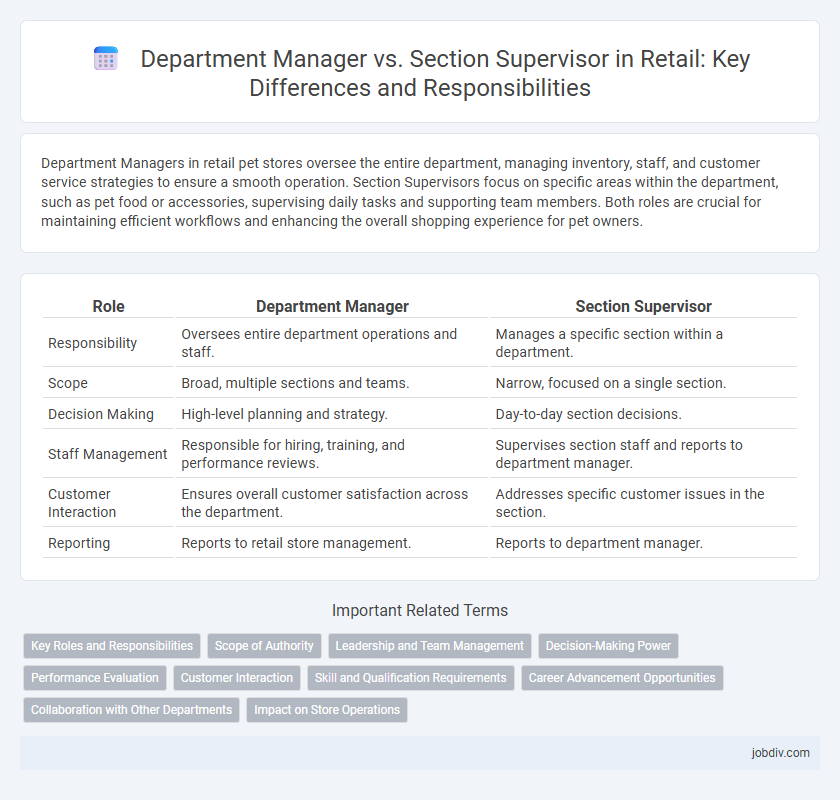Department Managers in retail pet stores oversee the entire department, managing inventory, staff, and customer service strategies to ensure a smooth operation. Section Supervisors focus on specific areas within the department, such as pet food or accessories, supervising daily tasks and supporting team members. Both roles are crucial for maintaining efficient workflows and enhancing the overall shopping experience for pet owners.
Table of Comparison
| Role | Department Manager | Section Supervisor |
|---|---|---|
| Responsibility | Oversees entire department operations and staff. | Manages a specific section within a department. |
| Scope | Broad, multiple sections and teams. | Narrow, focused on a single section. |
| Decision Making | High-level planning and strategy. | Day-to-day section decisions. |
| Staff Management | Responsible for hiring, training, and performance reviews. | Supervises section staff and reports to department manager. |
| Customer Interaction | Ensures overall customer satisfaction across the department. | Addresses specific customer issues in the section. |
| Reporting | Reports to retail store management. | Reports to department manager. |
Key Roles and Responsibilities
A Department Manager oversees overall store operations, manages budgets, staff recruitment, and strategic planning to drive sales performance and enhance customer experience. Section Supervisors focus on supervising daily activities within specific sections, ensuring product displays, inventory accuracy, and team productivity align with departmental goals. Both roles require strong leadership, but Department Managers have broader responsibilities encompassing financial targets and cross-department coordination.
Scope of Authority
Department Managers hold broader authority, overseeing entire departments and managing multiple section supervisors, budget allocation, staff scheduling, and overall sales targets. Section Supervisors have a more limited scope, handling day-to-day operations within a specific section, monitoring employee performance, and ensuring compliance with store policies. Department Managers are responsible for strategic decision-making, while Section Supervisors focus on operational execution within their designated areas.
Leadership and Team Management
Department Managers oversee multiple sections within a retail store, focusing on strategic leadership, budgeting, and overall performance metrics, ensuring alignment with corporate goals. Section Supervisors manage frontline teams in specific departments, directly guiding staff, scheduling shifts, and resolving day-to-day operational issues to maintain productivity and customer satisfaction. Effective leadership in retail requires Department Managers to develop broader team management skills while Section Supervisors excel in hands-on coaching and immediate problem-solving.
Decision-Making Power
Department Managers in retail hold greater decision-making power by overseeing overall store operations, setting sales targets, and managing budgets, while Section Supervisors focus primarily on executing assigned tasks and managing daily activities within a specific section. Department Managers authorize promotions, pricing strategies, and inventory orders, enabling them to influence broader business outcomes compared to Section Supervisors. The enhanced authority of Department Managers supports strategic planning and resource allocation across multiple sections for optimized store performance.
Performance Evaluation
Department Managers oversee overall store operations, focusing on strategic goals and team leadership, making their performance evaluation centered on sales targets, employee turnover rates, and customer satisfaction metrics. Section Supervisors manage specific store sections, with performance assessments based on inventory accuracy, section sales performance, and staff efficiency within their area. Both roles require regular reviews of operational effectiveness, but Department Managers are evaluated more on broader business outcomes while Section Supervisors are rated on detailed execution and team management in their section.
Customer Interaction
Department Managers oversee overall store operations and strategy, focusing less on direct customer interaction and more on team performance and inventory management. Section Supervisors engage more frequently with customers, handling immediate issues, providing product information, and ensuring a positive shopping experience on the floor. The direct customer interaction of Section Supervisors makes them key players in front-line service and customer satisfaction within specific store sections.
Skill and Qualification Requirements
Department managers require strong leadership skills, extensive retail experience, and a thorough understanding of inventory management and sales strategies. Section supervisors need solid organizational abilities, frontline staff supervision experience, and knowledge of daily operational tasks within a specific department. Both roles demand excellent communication skills, but department managers often hold higher educational qualifications such as a bachelor's degree in business or retail management.
Career Advancement Opportunities
Department Managers typically have broader responsibilities overseeing multiple sections, offering greater exposure to strategic decision-making and higher leadership roles. Section Supervisors focus on managing a specific team within one department, providing hands-on operational experience that builds foundational leadership skills. Career advancement opportunities for Department Managers often lead to store management or regional positions, while Section Supervisors may progress to Department Manager roles before ascending further.
Collaboration with Other Departments
Department Managers coordinate with multiple departments such as marketing, inventory, and finance to ensure overall store performance aligns with company goals. Section Supervisors primarily collaborate within their specific sections and communicate closely with Department Managers to address localized issues and streamline daily operations. Effective collaboration between both roles enhances cross-functional efficiency and improves customer service throughout the retail environment.
Impact on Store Operations
Department Managers oversee entire retail departments, driving sales performance, inventory management, and team development, significantly influencing store profitability and customer satisfaction. Section Supervisors handle specific store sections, ensuring daily operational tasks, employee scheduling, and customer service standards are maintained, directly affecting workflow efficiency and shopper experience. Effective collaboration between Department Managers and Section Supervisors optimizes store operations, boosting overall productivity and operational excellence.
Department Manager vs Section Supervisor Infographic

 jobdiv.com
jobdiv.com